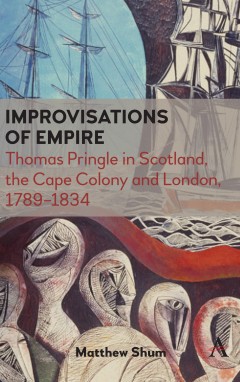Improvisations of Empire
Thomas Pringle in Scotland, the Cape Colony and London, 1789–1834
By Matthew Shum
- About This Book
- Reviews
- Author Information
- Series
- Table of Contents
- Links
- Podcasts
About This Book
‘Improvisations of Empire’ offers the first extended critical, biographical and historiographical account of the work of Thomas Pringle, a poet and writer who occupies a central place in the cultural imaginary of English-speaking, white South Africans. However, there has been, to date, no single study which attempts to encompass all the aspects of Pringle’s life and work, and, particularly, to examine his poetry in the ‘thick’ context of its different national locations and his importance as a transnational and not merely a local or colonial writer.
Using the methods of close reading, and combining these with an examination of the historical record (much of it archival material unknown to, or ignored by, previous scholarship), ‘Improvisations of Empire’ seeks to understand Pringle’s writing, particularly the poetry, within the layered histories of his Scottish Enlightenment background and his early literary exposure to both Scottish and English Romanticisms. It then traces how these formative influences are refracted, and fractured, by his colonial experiences in the Cape Colony, before undergoing yet another modification during his period of residence in London (1826–1834). It was during this final stage of Pringle’s career that most of his writing was published for the first time, and very little critical attention has been paid either to the retrospective character of these writings, or to how they are inflected by Pringle’s metropolitan status as a prominent abolitionist, secretary of the Anti-Slavery Society, an increasingly fervid evangelical and a prominent editorial figure in the world of the literary annuals so popular at the time. Matthew Shum additionally argues that, quite apart from his crucial importance to South African literature, Pringle can also be understood as a figure working at a revealing tangent to metropolitan paradigms. The study explores Pringle’s ‘improvisations’ of his imperial identity in various locations and suggests that his writing offers a limit case for mainstream literary paradigms as they press up against unfamiliar and often disturbing colonial conditions.
Reviews
“Improvisations of Empire shows how a careful reading of a literary oeuvre can transform how we think about the legacies of the colonial era. It rescues Pringle from the realms of liberal mythmaking, casting new light on a historical period in which nation-building, class-consciousness, abolition, Christian evangelism and colonialism were deeply entangled.” —Peter D. McDonald, Professor of English and Related Literature, University of Oxford, UK
“Thomas Pringle has been a long-time icon of South African liberalism. Matthew Shum’s new study presents a more complex figure caught up in the contradictions of empire by a career that comprised poetry, settler propaganda and abolitionism. Equally in command of close reading and relocations that include Scotland, Cape Colony and mid-nineteenth-century London, Improvisations of Empire is a truly eye-opening study.” —Jon Mee, Professor of Eighteenth Century Studies, University of York and British Academy/Leverhulme Senior Research Fellow
“Improvisations of Empire is a remarkable achievement, which is likely to remain the definitive reading of Thomas Pringle for many years to come.” —David Attwell, Professor of Modern Literature, University of York, UK
“Shum has brought to life Thomas Pringle in all his capacities: Scottish Romantic poet, South African settler and London-based advocate for abolition. A rich and important study of a complex man.” —Jason Rudy, Professor of English, University of Maryland, College Park, USA
In his book Improvisations of Empire, Matthew Shum critically analyses the life and works of Thomas Pringle. Is the space that Pringle occupies in the history of South African Writing, one that he is justified in holding? Is there a need for re-assessment of his position? These are some of the questions that this book will lead the readers to ask. — Dhrubajyoti Banerjee, https://postcolonialinterventions.files.wordpress.com/2020/07/pi-5.2-dhruba-review.pdf, published June 30, 2020
Author Information
Matthew Shum, a research associate in the English department at the University of Stellenbosch, South Africa, has previously taught in the English department at the University of KwaZulu-Natal. The focus of Shum’s research is colonial writing in South Africa in the long eighteenth century.
Series
Anthem Advances in African Cultural Studies
Table of Contents
Introduction; 1. Scotland: 1789–1820; 2. The Eastern Cape Frontier: 1820–1822; 3. Cape Town and Beyond: 1822–1825; 4. London: 1826–1834; Conclusion; Bibliography; Index.
Links
Stay Updated
Information
Latest Tweets



